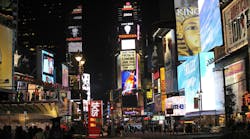First-quarter profits vanished into a loss of SEK 16.6 million ($1.6M) at Sweden’s Fagerhult Group as the company felt the financial impact of the coronavirus.
A year ago, Habo-based Fagerhult had reported a pre-tax profit of SEK 126.5M ($12.65M) for the quarter ending Mar. 31. But early 2020’s global health crisis hit hard. Among other measures, it forced production shutdowns at two of Fagerhult’s largest companies, iGuzzini in Italy and Whitecroft in the UK, which together last year accounted for nearly 40% of business.
“Both factories were closed for a period of time and this had an immediate and significant impact on the ability to make deliveries,” Fagerhult said in a press release. “Last year, these two businesses combined delivered 38% of the group’s net sales.”
Comparable sales for all of Fagerhult fell 14% to SEK 1.37B ($137M) from SEK 1.59B ($159M) in the first quarter of 2019. Overall sales edged up 6% to SEK 1.69B ($169M). Fagerhult closed its acquisition of iGuzzini in early March of 2019.
Sounding a positive note, the company pointed out that “an encouraging sign is that organic order intake was strongly positive for the first time in over two years.”
CEO Bodil Sonesson described the order growth as “a strong signal of the work done during 2019 and the new strategic alignment model within the Collection, Premium, Professional, and Infrastructure business areas.” She was referring to a broad business restructuring that took hold in January.
The order surge looks unlikely to continue.
“It would be too optimistic to expect that order intake continues to improve under the current COVID-19 conditions,” Sonesson said. “Our planning now looks to the second half of 2020 and further, where we possibly see a reduction in activity and with a period of time for the recovery to turn positive. We plan to be well prepared for this.”
Fagerhult has already withdrawn a previously announced dividend, and has postponed its annual general meeting from May 5 until June 23, in response to the pandemic.
In a one-off consequence of COVID-19, Fagerhult noted that the cancellation of the March Light + Building industry exhibition in Frankfurt cost the company SEK 20M ($2M) on an immediate basis. That event was since rescheduled to take place from Sept. 27‒Oct. 2.
As a separate matter, Fagerhult also reported that the difficulties it had previously disclosed integrating iGuzzini’s ERP software hit operating profits by approximately SEK 25M ($2.5M).
For the first time, the SEK 7.84B ($784M) company reported sales by its new divisions, and compared those sales to what they would have been in the first quarter of 2019 had the new structure been in place then.
Collection, aimed at designers and architects on a global basis both indoors and out, registered SEK 707.2M ($70.7M) in the first quarter of 2020 compared to SEK 508.6M ($50.9M) in the first quarter of 2019. Its growth would reflect the acquisition of iGuzzini. Premium, aimed at European specifiers, partners, and bespoke installation chiefly indoors, had sales of SEK 669.4M ($66.9M), down from SEK 754.9M ($75.5M). “Market activity is mixed,” Fagerhult stated, referring to geographies. “Net sales have reduced in Sweden, Denmark, Spain, and Germany, some being due to a reduced demand, some a strong prior year, and some COVID-19 related,” Fagerhult stated.
Professional, focused on indoor applications in markets local to the brand and also involving specifiers and bespoke, fell to SEK 208.2M ($20.8M), from SEK 250.8M ($25.1M). “Net sales have reduced in all business except in Turkey,” Fagerhult noted. “Of the most significant impact is the effect of COVID-19, especially in the UK and South African businesses, where for a period of time there were operational closures. With physical distancing and working from home measures, current capabilities are generally 20‒25% down on what can be described as normal.”
Infrastructure, which targets environments where durability and robustness is key and which is primarily Europe-focused, grew to SEK 190M ($19M) from SEK 179.3M ($17.9M). “Net sales have been particularly strong in the industrial and warehousing segment,” Fagerhult said. “Public sector spending in the UK has reduced as a result of Brexit and this continues to affect the Designplan business.”
The new setup and their brands are Collection, with ateljé Lyktan, iGuzzini, LED Linear, and WE-EF; Premium, with Fagerhult and LTS and also with Melbourne, Australia-based OR Technologies, which provides Organic Response IoT technology internally to the Fagerhult companies; Professional, with Arlight, Eagle Lighting, Lighting Innovations, and Whitecroft; and Infrastructure, with Designplan Lighting, i-Valo, and Veko.
CEO Sonesson will foster “many organic growth opportunities in the medium-to-longer term.” She also said future acquisitions are in order.
Sonesson expressed confidence in the company’s IoT lighting initiatives, in which the 13 Fagerhult brands draw on technology from OR Technologies, the company that Fagerhult acquired in April 2017.
“We continue to make good progress with connected solutions, and this remains a key part of the strategy,” Sonesson said. “In the new setup, we take a group-wide approach and coordinate the group’s activities in one central function that includes our lighting controls brand, Organic Response.”
Her remarks brought to mind those of Signify CEO Eric Rondolat, who told analysts last week that Signify is taking the opportunity of the global slowdown to educate customers on IoT lighting. Signify, the world’s largest lighting company, is also taking other business actions in response to the COVID-19 outbreak, including ratcheting up development and production of ultraviolet disinfection lighting.
Eindhoven, Holland-based Signify last week reported a 39.2% tumble in first quarter profits. It has withdrawn its financial guidance for the year. Its executives have taken 20% pay cuts, and about 85% of employees have accepted a voluntary opportunity to reduce their workload and pay by 20%.
Munich-based Osram, the world’s second-largest lighting company, is scheduled to issue financial results for its fiscal second quarter on May 7. It is considering cutting employee hours amid the outbreak, and has already said it will miss its financial targets for the year.
MARK HALPER is a contributing editor for LEDs Magazine, and an energy, technology, and business journalist ([email protected]m).
For up-to-the-minute LED and SSL updates, why not follow us on Twitter? You’ll find curated content and commentary, as well as information on industry events, webcasts, and surveys on our LinkedIn Company Page and our Facebook page.





